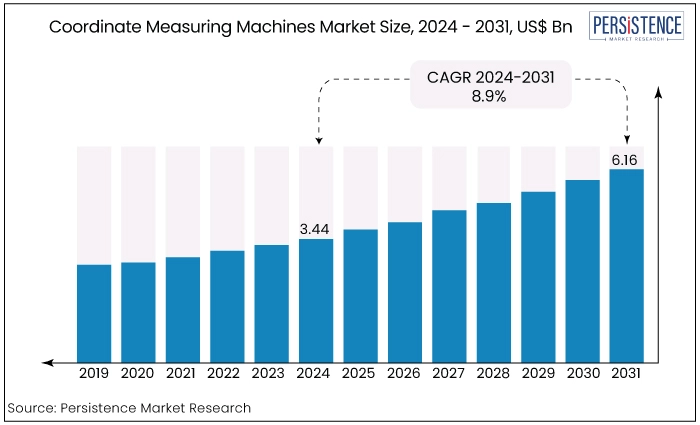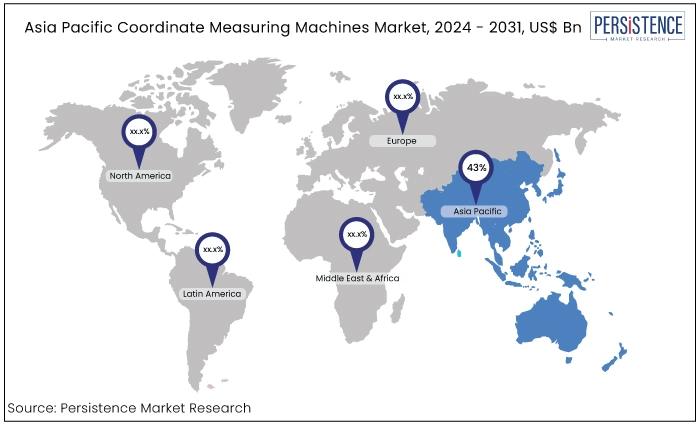Industry: Industrial Automation
Published Date: August-2024
Format: PPT*, PDF, EXCEL
Delivery Timelines: Contact Sales
Number of Pages: 188
Report ID: PMRREP18091
The coordinate measuring machines market is estimated to increase from US$3.44 Bn in 2024 to US$6.16 Bn by 2031. The market is projected to record a CAGR of 8.9% during the forecast period from 2024 to 2031. North America and Europe are leading in market share, with significant contributions from Asia-Pacific due to rising industrialization. The market's future growth is anticipated to be fueled by innovations in portable and 3D CMMs.

Key Highlights of the Market
|
Market Attributes |
Key Insights |
|
Coordinate Measuring Machines Market Size (2024E) |
US$3.44 Bn |
|
Projected Market Value (2031F) |
US$6.16 Bn |
|
Global Market Growth Rate (CAGR 2024 to 2031) |
8.9% |
|
Historical Market Growth Rate (CAGR 2019 to 2023) |
8.7% |
|
Region |
Market Share in 2023 |
|
Asia Pacific |
43% |
Asia Pacific has a significant share of the CMM market and this dominance is driven by the robust manufacturing sectors in countries like China, Japan, and South Korea. This region has seen rapid industrial growth particularly in countries like China, Japan, and South Korea, which boosts the demand for precision measurement tools like CMMs.
The strong presence of automotive and aerospace industries in the region drives the need for high-precision measurement and quality control, further increasing the demand for CMMs.
The primary factors that contribute to the dynamic nature of APAC for CMMs are the extensive industrial base and funding for R&D of heavy machinery, with China and Japan being the primary contributors.
One of the factors driving the demand for CMMs in this region is the reduction of material wastage caused by inaccuracy and defective manufacturing, which is achieved through the use of CMMs.

|
Category |
Market Share in 2024 |
|
Type - Bridge |
22.1% |
The market for coordinate measuring machines is classified into fixed, bridge, cantilever and gantry based on type. Among these, the bridge type segment dominates the market growth. Bridge CMMs held the largest market share accounting for around 22.1% owing to their extensive range of solutions for industrial purposes, where repeatability, high accuracy, and automated dimensional inspection are required.
Bridge CMMs are known for their high precision and versatility making them suitable for various applications across various industries, including automotive, aerospace, and manufacturing. These machines can handle large and heavy parts providing a significant measurement volume which is essential for industries that require the inspection of large components.
|
Category |
Market Share in 2024 |
|
Industry - Automotive |
15.4% |
Based on industry, the global coordinate measuring machines market is further classified into automotive, electronics, energy & power, and medical, where the automotive industry dominates the market and to account for 15.4 of the market share in 2024.
The automotive industry is projected to maintain its leading position, driven by the increasing need for precision measurement and quality control in manufacturing processes.
The automotive industry demands high precision in manufacturing components to ensure safety, performance, and compliance with stringent quality standards.
CMMs are essential for achieving these precise measurements. Automotive parts often have complex geometries that require accurate measurement and inspection. CMMs provide the necessary capabilities to measure these intricate shapes accurately.
Coordinate measuring machines (CMMs) are very accurate measurement instruments utilized in quality control and manufacturing processes to determine an object's geometric characteristics precisely. These devices utilize a probe to systematically measure locations on the surface of an item in three dimensions. The probe is often situated along three or more axes.
CMMs utilize a coordinate system to accurately determine and document the positions of these points relative to a reference point or points on the object. Subsequently, the data above is scrutinized to assess the measured object's surface profiles, dimensional accuracy, and other geometric attributes.
CMMs are available in several designs, such as portable, gantry, and bridge types, which can be purchased. They can also be acquired with several probes, including non-contact or tactile (contact) probes. They also provide precise measurements of the dimensions of intricate parts and components.
Coordinate measuring machines (CMMs) are vital for quality control since they verify the conformity of manufactured objects with established standards and tolerances. They possess the capability to identify flaws such as surface imperfections, errors in shape, variations in size, and deviations from established design criteria.
Increasing Demand for Precision Manufacturing
Industries such as automotive, aerospace, and electronics require high precision in manufacturing processes to ensure quality and compliance with stringent standards. Precision manufacturing requires highly accurate measurements to ensure that parts and components meet exact specifications.
CMMs provide the necessary precision making them essential in aerospace, automotive, and medical devices. Innovations in CMM technology like the integration of robotic systems and automated probe changers have improved accuracy, repeatability, and throughput. These advancements support the growing need for precision in manufacturing processes.
Growing Adoption of Industry 4.0 Principles
The rise of Industry 4.0 has led to increased adoption of advanced metrology solutions, including CMMs, to meet the evolving needs and expectations of various industries. Also, industry 4.0 emphasizes the integration of advanced technologies like robotics, AI, and IoT into manufacturing processes.
CMMs equipped with robotic systems and automated probe changers can perform complex measurements and inspections with high precision and repeatability. Using sensors and data analytics in Industry 4.0 allows real-time monitoring and quality control. CMMs play a crucial role in collecting accurate dimensional data, which can be analysed to improve manufacturing processes and product quality.
High Cost of Equipment
CMMs are expensive, which can be a significant barrier to entry for many potential customers, especially small and medium-sized enterprises. The upfront cost of purchasing a CMM can be substantial. Prices for these machines can range from US$20,000 for basic manual units to over US$1 million for advanced gantry-type models. Beyond the initial purchase, there are additional costs for software, probes, and other supporting hardware. These expenses can significantly increase the total cost of ownership.
Lack of Skilled Operators
Operating CMMs requires specialized skills and training. The shortage of skilled operators can limit these machines' adoption and effective use. Operating a CMM needs specialized training and expertise.
The complexity of these machines means that operators need to be proficient in using advanced software and understanding precise measurement techniques. The manufacturing industry needs skilled precision machine operators. The increasing demand for high-precision measurements exacerbates this shortage.
Integration of CMMs with Industry 4.0 and Smart Manufacturing
A significant opportunity in the coordinate measuring machine (CMM) market lies in the integration of CMMs with Industry 4.0 technologies and smart manufacturing practices. As industries across the globe transition toward connected and automated production environments, there is a growing demand for precision measurement tools.
Industry 4.0 emphasizes using digital technologies such as IoT (Internet of Things), AI (Artificial Intelligence), and big data analytics to create smart, and efficient manufacturing processes.
CMMs, which are critical for ensuring product quality and dimensional accuracy are increasingly being enhanced with these technologies. Manufacturers can achieve real-time data collection, analysis, and feedback by connecting CMMs to a broad network of sensors and devices on the production floor, leading to more informed decision-making.
By integrating CMMs with digital twin technologies, manufacturers can simulate, predict, and optimize manufacturing processes before physical production begins. This enhances product quality and reduces lead times and costs associated with prototyping and testing.
CMMs equipped with advanced software can feed accurate dimensional data into digital twins, ensuring that virtual models reflect real-world conditions with high precision. Moreover, as industries increasingly focus on mass customization, where products are tailored to individual specifications, the demand for CMMs capable of rapid, accurate measurements will rise.
The coordinate measuring machine (CMM) market is highly competitive with key players including Hexagon AB, Zeiss Group, Mitutoyo Corporation, Nikon Metrology, and Faro Technologies. These companies dominate the market through continuous innovation, extensive product portfolios, and strong global distribution networks.
Technological advancements, such as automation, integration with Industry 4.0, and enhanced software capabilities drive the competition. Small and regional players focus on niche markets and specialized solutions to differentiate themselves. Strategic partnerships, mergers, and acquisitions are expected as companies seek to expand their market presence and technological capabilities.
Recent Industry Developments in the Coordinate Measuring Machines Market
|
Attributes |
Details |
|
Forecast Period |
2024 to 2031 |
|
Historical Data Available for |
2019 to 2023 |
|
Market Analysis |
US$ Billion for Value |
|
Key Regions Covered |
|
|
Key Market Segments Covered |
|
|
Key Companies Profiled in the Report |
|
|
Report Coverage |
|
|
Customization & Pricing |
Available upon request |
By Type
By Industry
By Application
By Region
To know more about delivery timeline for this report Contact Sales

The market is estimated to reach US$3.44 Bn in 2024.
The market is projected to capture CAGR of 8.9% during the forecast period from 2024 to 2031.
Keyence Corporation, ZEISS International, Mitutoyo America Corporation, CREAFORM, Applied Automation Technologies Inc., are a few of the leading manufacturers.
The growing adoption of Industry 4.0 is one of the key elements for the market growth.
Asia Pacific to dominate the market with large market share.